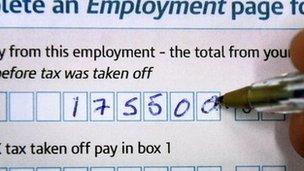Budget 2012: Farewell, 50p tax rate
- Published

The "true" extra tax raised by the 50p rate was just £1.1bn in 2010-11, the HMRC estimates
So, farewell then, 50 pence tax rate.
You caused "massive distortions". So next year you will be cut down to size - 45p in the pound.
After counting the pounds and pennies for your first year of operation - 2010-11 - the HM Revenue & Customs (HMRC) has decided you were not worth having after all.
Chancellor George Osborne was gleeful in telling Parliament that you had raised only £1bn or so extra - rather less than the £2.5bn or so that Labour had predicted back in 2009.
"HMRC find that an astonishing £16bn of income was deliberately shifted into the previous tax year - at a cost to the taxpayer of £1bn, something that the previous government's figures made no allowance for whatsoever," the chancellor said.
"Self-assessment receipts this year are below forecast by some £3.6bn, while other tax receipts have held up."
So is this true, and why did the Revenue take so long to come to that conclusion?
The penny drops
After all, this is what a variety of economists, business people, Tory MPs and some think tanks had been saying ever since the new 50p rate started in April 2010.
In fact the HMRC was ordered by Mr Osborne last year to analyse the tax receipts for 2010-11.
And these can only be scrutinised now because the self-assessment system means that about nine million taxpayers only paid the tax they owed for that year at the start of February this year.
About 90% of these returns are now in. And the 300,000 or so additional rate taxpayers are almost certainly all going to be in the self-assessment system.
The HMRC's main conclusion is that some wealthy people took much greater steps than anticipated to avoid paying the tax, at least in the first year.
The main method was for owner-directors of companies to take dividends from investments in the previous tax year when the highest rate was still 40p in the pound.
"The conclusion that can be drawn from the self-assessment data is therefore that the underlying yield from the additional rate is much lower than originally forecast (yielding around £1bn or less), and that it is quite possible that it could be negative," HMRC said in its60-page report, external.
Fast movers
The latest figures are still estimates and the Revenue says there is a still a margin of uncertainty about its figures.
They hinge not just on counting how much income tax came in for 2010-11, but trying to guess how much would have been garnered if the 40p rate had still been the top rate in force.
One key problem highlighted for tax collectors is that these days it much easier for highly-paid people to simply move from one country to another to save tax.
"International labour mobility has increased in the last 15 to 20 years as both legal impediments and general migration costs have been reduced, which means the adverse affect of high rates of personal taxation on both inward and outward migration to the UK and tax revenues can be significant," HMRC says.
Top earnings slump
Much of the HMRC's report involves extrapolating from academic theories and past academic research to guess what the effect of the 50p rate might have been.
But a key fact leaps out of chart 5.1 on page 27.
The HMRC thinks that the total declared taxable income of those earning more than £150,000 a year slumped from £116bn in 2009-10, to £87bn in 2010-11.
Not all of that can be attributed to a new 50p tax rate. But HMRC reckons some of it can.
"The model suggests that if the additional rate had not been introduced, total net incomes for those with incomes over £150,000 would have been around £107bn," it says.
"This compares with the observed total income figure of £87bn, a difference of £20bn."
Why was that? We go back to the pre-emptive measures taken by people who could control their incomes.
"The analysis suggests that between £16bn and £18bn of income was brought forward to 2009-10 to avoid the additional rate of tax," HMRC says.
"The magnitude of the forestalling demonstrates how responsive high income taxpayers are to changes in tax rates."
The final result
Stripping out the effect of all this evasive action, the HMRC finally estimates that the "true" effect of the 50p rate was to increase the income tax take, but only by £1.1bn.
Even that is uncertain, it says.
And an alternative calculation suggests that the "true" tax take might in fact have fallen as a result of the 50p rate coming into effect.
Ronnie Ludwig, of accountancy firm Saffery Champness, was not surprised by the Revenue's findings.
And he warned that there might be more disappointing tax collection figures to come, with the 50p rate now about to live on for a third year.
"I am surprised at the delay in implementing the 45p rate for another year," he said.
"We will have another year of some people minimising their income and maximising their spending on items that are tax deductible," he added.